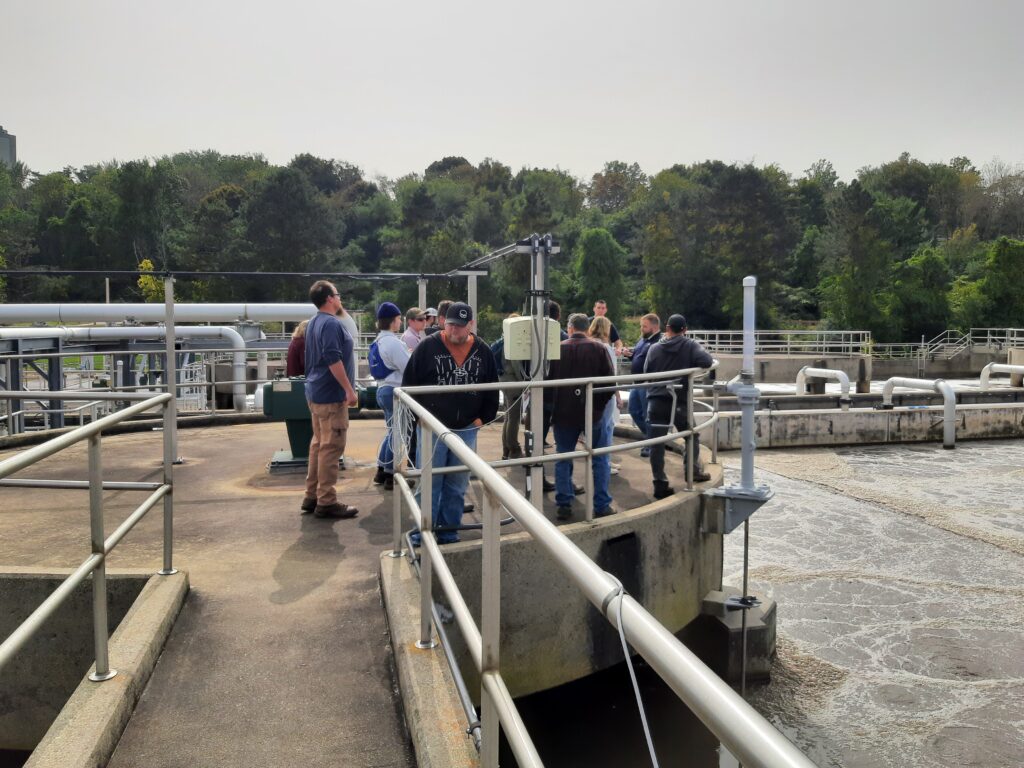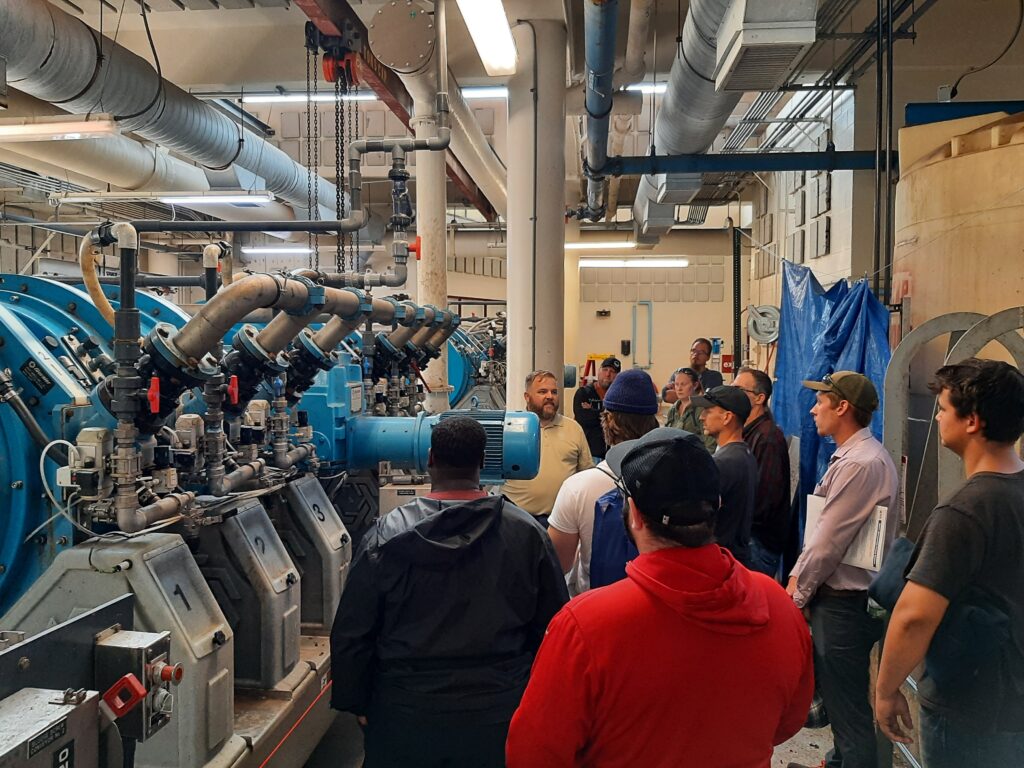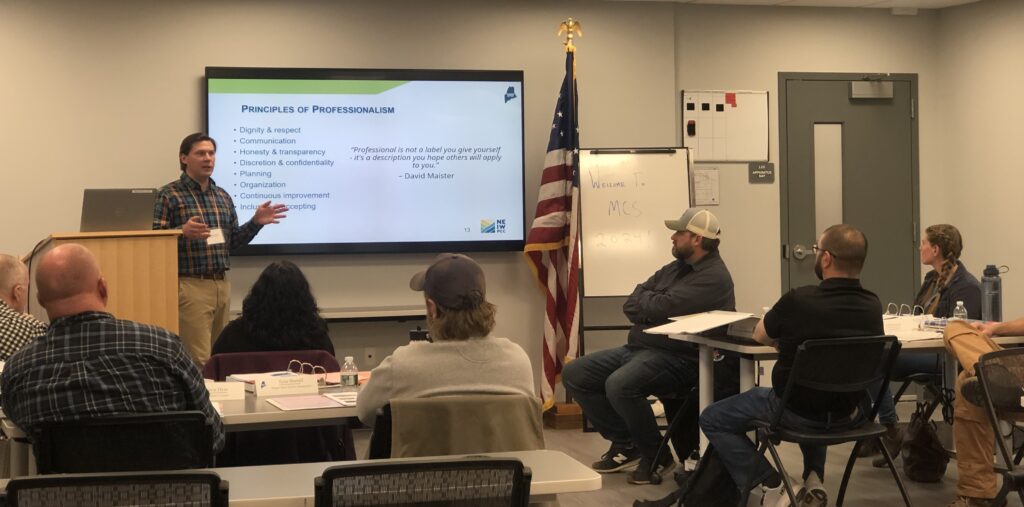By Peter Zaykoski
It’s just after 8 a.m. on a beautiful Maine fall morning and the training room at Portland Water District is slowly filling with students who are about to start the first of three days of instruction on basic wastewater treatment. Their class is focused on the purpose and history of wastewater treatment, professional certification, and wastewater basics including sampling.
Water professionals such as these students have been attending classes held by Maine’s Joint Environmental Training Coordinating Committee (JETCC) for forty years. While the details in the content and the teaching technology have certainly changed since the 1980s, many of the fundamentals have not and would be recognizable to the student’s peers of the past.

Establishment of JETCC
In the years following the enactment of the Clean Water Act in 1972, utilities across the country built wastewater treatment plants, and the first cohort of water professionals entered the field, making major progress in cleaning up the nation’s waterways.
In 1983, the Maine Water Environment Association (MEWEA, previously called the Maine Wastewater Control Association), the Maine Department of Environmental Protection (DEP), and the New England Regional Wastewater Institute (NERWI), a NEIWPCC program, began discussions about the availability and adequacy of training for clean water professionals in the state. Out of this collaboration, a bill (LD 1837) to create JETCC was taken up in the legislature and ultimately signed by Governor Joseph Brennan in 1984. The Maine Joint Environmental Training Coordinating Committee (JETCC) was born.
Henry Warren, the Maine DEP commissioner, appointed a committee composed of agency officials, utility managers, and professional association representatives who developed the initial plans for the training curriculum. The committee completed surveys of utilities in the state and developed a training approach to meet the needs of the professionals in the state. The committee selected NEIWPCC as the entity to implement the program through NERWI.
JETCC’s training calendar was launched in the fall of 1985, and the first class offered was “Wastewater Treatment: Your Number One Investment,” held in Portland. From the very beginning, JETCC’s approach focused on recruiting volunteers from the clean water industry as instructors and relying on partners throughout the state to donate training spaces.

Workforce Development
Throughout JETCC’s history, it has focused on advancing the careers of clean water professionals and helping to educate new staff on operations and maintenance fundamentals to be successful at their facilities. Every year, JETCC offers two dozen or more regular training opportunities focused on wastewater treatment processes and troubleshooting, collection system topics, and current issues, such as biosolids management. Many operators are required by the state to be certified. JETCC frequently provides preparation classes for certification exams.
In recognition of an impending wave of retirements of the first cohort of water professionals, JETCC established a Management Candidate School in 2009 to prepare the next generation of mid-career professionals for management roles in their utilities. A year later, the program scope was expanded to serve both clean water and drinking water staff. Classes cover topics ranging from personnel management to budgeting and rate setting.
The program also offers instruction related to technical topics such as geographic information systems, blueprint reading, and supervisory control and data acquisition (SCADA) systems. The in-person format and additional elements, such as conference attendance, provide an additional opportunity for the students to form connections with their colleagues and practice skills, like interacting with vendors that are important in management roles. The current class graduates at the 2025 MEWEA Fall Convention in September and joins the more than 230 water professionals who have completed the program before them.

The need for new operators in the industry has been strong as mid-career professionals move up in their organizations. Throughout JETCC’s history, it has offered introductory programming for new operators. Multiday training series concepts coalesced in 2017 into the most recent of JETCC’s flagship programs: Wastewater Operator School, initially developed largely by the Maine DEP and the Portland Water District. The program is composed of 12 sessions over six months, focused on fundamentals in wastewater treatment and operations. The next iteration will be offered again based out of Portland Water District in early 2026.
Serving All of Maine
Maine’s unique geography and demography present challenges for JETCC to achieve the element of its mission to serve professionals throughout the state. North of Bangor, the population density drops and travel distance for services increases. Aroostook County, Maine’s largest, caps the state and is characterized by vast forests with a swath of agricultural land that follows the eastern border with Canada.
In order to serve the northern reaches of the state, JETCC began one of its first flagship programs in 1990: the North Country Convention. Since then, this training conference has been held nearly every other year in Presque Isle, Maine, most recently this past April. Many utilities in Aroostook County provide both drinking water and wastewater services. As such, the convention’s focus has grown to ensure training opportunities for operators who work on both sides of the industry.
Community Support
In the last decade alone, JETCC programs have had more than 6,100 attendees and awarded more than 48,000 hours of continuing education credits. This success would not be possible without the support and efforts of the clean water and drinking water community in the state of Maine and the Northeast region more broadly. The original collaborative relationships among Maine DEP, MEWEA, and NEIWPCC continue to this day and are critical in the success of the program. Relationships with other organizations in the state, including the Maine Water Utilities Association, have blossomed and led to a broader scope of services for JETCC programming and advanced the connection among water professionals. Ultimately, JETCC’s success is due to the innumerable volunteers who have provided instruction, input on curricula, provided training spaces, and monetary support over the last 40 years.
Back at the Portland Water District, the students are finishing their first day of training. The students may not know it, but they may have just started relationships that will support them over the next several decades of their careers. Peers that they meet in their class, that they will meet again in a couple of weeks, may show up once again in a decade in Management Candidate School. Five years later, they may be calling those same individuals seeking guidance on a tough situation or help when something goes wrong. And perhaps, after seeing the power of sharing knowledge through training, they find themselves in front of a classroom, providing instruction to the next generation of water professionals.
This article was originally published in the Fall 2025 edition of Interstate Waters magazine. Peter Zaykoski is the program manager of NEIWPCC’s South Portland office.